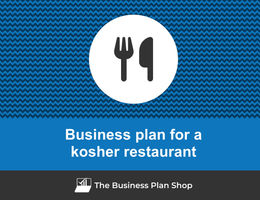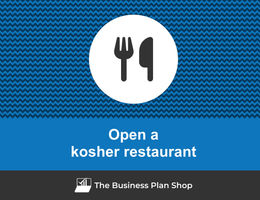How to create a financial forecast for a kosher restaurant?
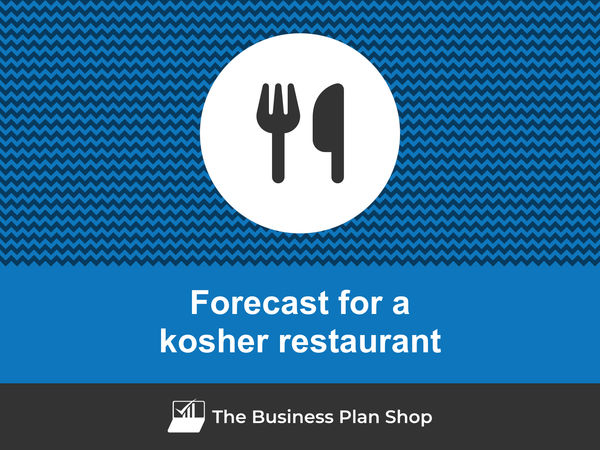
Creating a financial forecast for your kosher restaurant, and ensuring it stays up to date, is the only way to maintain visibility on future cash flows.
This might sound complex, but with the right guidance and tools, creating an accurate financial forecast for your kosher restaurant is not that hard.
In this guide, we'll cover everything from the main goal of a financial projection, the data you need as input, to the tables that compose it, and the tools that can help you build a forecast efficiently.
Without further ado, let us begin!
Why create and maintain a financial forecast for a kosher restaurant?
Creating and maintaining an up-to-date financial forecast is the only way to steer the development of your kosher restaurant and ensure that it can be financially viable in the years to come.
A financial plan for a kosher restaurant enables you to look at your business in detail - from income to operating costs and investments - to evaluate its expected profitability and future cash flows.
This gives you the visibility needed to plan future investments and expansion with confidence.
And, when your trading environment gets tougher, having an up to date kosher restaurant forecast enables you to detect potential upcoming financing shortfalls in advance, enabling you to make adjustments or secure financing before you run out of cash.
It’s also important to remember that your kosher restaurant's financial forecast will be essential when looking for financing. You can be 100% certain that banks and investors will ask to see your numbers, so make sure they’re set out accurately and attractively.
Need a convincing business plan?
The Business Plan Shop makes it easy to create a financial forecast to assess the potential profitability of your projects, and write a business plan that’ll wow investors.

What information is used as input to build a kosher restaurant financial forecast?
A kosher restaurant's financial forecast needs to be built on the right foundation: your assumptions.
The data required to create your assumptions will depend on whether you are a new or existing kosher restaurant.
If you are creating (or updating) the forecast of an existing kosher restaurant, then your main inputs will be historical accounting data and operating metrics, and your team’s view on what to expect for the next three to five years.
If you are building financial projections for a new kosher restaurant startup, you will need to rely on market research to form your go-to-market strategy and derive your sales forecast.
For a new venture, you will also need an itemised list of resources needed for the kosher restaurant to operate, along with a list of equipment required to launch the venture (more on that below).
Now that you understand what is needed, let’s have a look at what elements will make up your kosher restaurant's financial forecast.
The sales forecast for a kosher restaurant
From experience, it is usually best to start creating your kosher restaurant financial forecast by your sales forecast.
To create an accurate sales forecast for your kosher restaurant, you will have to rely on the data collected in your market research, or if you're running an existing kosher restaurant, the historical data of the business, to estimate two key variables:
- The average price
- The number of monthly transactions
To get there, you will need to consider the following factors:
- Seasonal Demand: The demand for kosher food may fluctuate depending on the time of year. During holidays such as Passover and Rosh Hashanah, there may be an increase in demand for kosher meals, resulting in higher average prices and more monthly transactions.
- Competition: The presence of other kosher restaurants in the area can affect your sales. If there are many competitors, you may need to adjust your prices or offer special deals to attract customers and maintain your average price and number of transactions.
- Kosher Certification: Having a reputable kosher certification can attract more customers and potentially increase your average price. This is because customers may be willing to pay a premium for a certified kosher meal.
- Tourism: If your restaurant is located in a popular tourist destination, you may experience a surge in demand during peak tourist season. This can result in higher average prices and more transactions as tourists may be interested in trying authentic kosher cuisine.
- Food Trends: Keeping up with current food trends in the kosher market can attract new customers and retain existing ones. Offering innovative and trendy dishes can justify higher average prices and result in more monthly transactions.
Once you have an idea of what your future sales will look like, it will be time to work on your overhead budget. Let’s see what this entails.
Need a convincing business plan?
The Business Plan Shop makes it easy to create a financial forecast to assess the potential profitability of your projects, and write a business plan that’ll wow investors.

The operating expenses for a kosher restaurant
The next step is to estimate the expenses needed to run your kosher restaurant on a day-to-day basis.
These will vary based on the level of sales expected, and the location and size of your business.
But your kosher restaurant's operating expenses should include the following items at a minimum:
- Staff Costs: This includes the salaries and benefits for your kitchen staff, servers, and other employees.
- Kosher Certification Fees: In order to operate as a kosher restaurant, you will need to pay for certification from a rabbinical organization.
- Food Costs: This includes the cost of purchasing kosher ingredients and supplies for your menu items.
- Rent: You will need to pay rent for your restaurant space, which can vary depending on location and size.
- Accountancy Fees: It is important to hire an accountant to help with budgeting, taxes, and other financial aspects of your business.
- Insurance Costs: You will need to have insurance coverage for your restaurant, including liability and property insurance.
- Marketing and Advertising: This includes the cost of promoting your restaurant to attract customers, such as through social media, flyers, and other forms of advertising.
- Utilities: You will need to pay for electricity, water, and gas for your restaurant, as well as any other necessary utilities.
- Software Licences: You may need to purchase licenses for software programs used in your restaurant, such as a point-of-sale system or accounting software.
- Cleaning and Maintenance: You will need to hire a cleaning service and pay for regular maintenance to keep your restaurant clean and in good condition.
- Banking Fees: You will likely have to pay fees for business banking services, such as for processing credit card payments and managing your accounts.
- Waste Disposal: Properly disposing of food and other waste is an important expense for a kosher restaurant.
- Repairs and Maintenance: You will need to budget for unexpected repairs and maintenance for equipment and other areas of your restaurant.
- Training and Development: It is important to invest in training for your staff to ensure they provide the best kosher dining experience for your customers.
- Taxes and Permits: You will need to pay taxes on your business income and obtain necessary permits to operate a restaurant.
This list is, of course, not exhaustive, and you'll have to adapt it according to your precise business model and size. A small kosher restaurant might not have the same level of expenditure as a larger one, for example.
What investments are needed to start or grow a kosher restaurant?
Your kosher restaurant financial forecast will also need to include the capital expenditures (aka investments in plain English) and initial working capital items required for the creation or development of your business.
For a kosher restaurant, these could include:
- Kosher Kitchen Equipment: This includes all the necessary equipment for a kosher kitchen, such as separate meat and dairy stations, double ovens, and sinks. These items are essential for maintaining kosher standards and ensuring that the food is prepared and stored correctly.
- Kosher Certification: Obtaining kosher certification for your restaurant involves paying for an inspection and certification from a reputable kosher certifying agency. This is an important expense for kosher restaurants as it assures customers that your establishment adheres to kosher guidelines.
- Kosher Inventory: Stocking your restaurant with kosher ingredients and products can be more expensive than non-kosher options. This may include items such as kosher meat, dairy, and wine, as well as specialty kosher products like matzo and challah bread.
- Kosher Signage and Decor: Creating a welcoming and inviting atmosphere for your kosher restaurant may involve purchasing specific signage and decor items. This can include a mezuzah for the entrance, kosher symbols for the walls, and other religious or cultural decor.
- Kosher Training and Education: In order to maintain kosher standards, it is important for your staff to receive proper training and education on kosher practices. This may involve hiring a kosher consultant or sending your staff to workshops or seminars.
Again, this list will need to be adjusted according to the size and ambitions of your kosher restaurant.
Need a convincing business plan?
The Business Plan Shop makes it easy to create a financial forecast to assess the potential profitability of your projects, and write a business plan that’ll wow investors.

The financing plan of your kosher restaurant
The next step in the creation of your financial forecast for your kosher restaurant is to think about how you might finance your business.
You will have to assess how much capital will come from shareholders (equity) and how much can be secured through banks.
Bank loans will have to be modelled so that you can separate the interest expenses from the repayments of principal, and include all this data in your forecast.
Issuing share capital and obtaining a bank loan are two of the most common ways that entrepreneurs finance their businesses.
What tables compose the financial plan for a kosher restaurant?
Now let's have a look at the main output tables of your kosher restaurant's financial forecast.
The forecasted profit & loss statement
The profit & loss forecast gives you a clear picture of your business’ expected growth over the first three to five years, and whether it’s likely to be profitable or not.
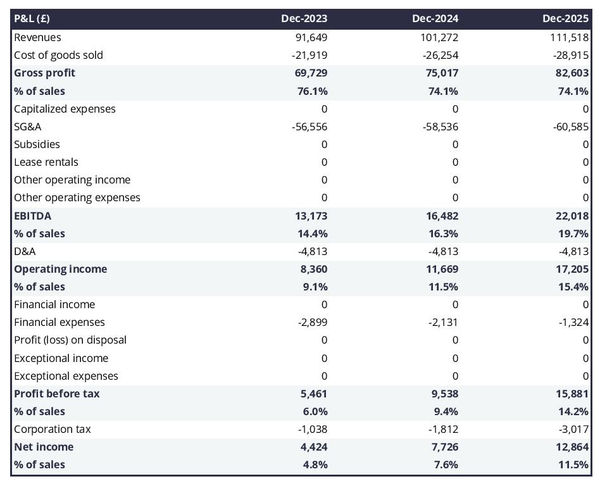
A healthy kosher restaurant's P&L statement should show:
- Sales growing at (minimum) or above (better) inflation
- Stable (minimum) or expanding (better) profit margins
- A healthy level of net profitability
This will of course depend on the stage of your business: numbers for an established kosher restaurant will look different than for a startup.
The projected balance sheet
Your kosher restaurant's forecasted balance sheet enables you to assess your financial structure and working capital requirements.
It is composed of three types of elements: assets, liabilities and equity:
- Assets: represent what the business owns and uses to produce cash flows. It includes resources such as cash, equipment, and accounts receivable (money owed by clients).
- Liabilities: represent funds advanced to the business by lenders and other creditors. It includes items such as accounts payable (money owed to suppliers), taxes due and loans.
- Equity: is the combination of what has been invested by the business owners and the cumulative profits and losses generated by the business to date (which are called retained earnings). Equity is a proxy for the value of the owner's stake in the business.
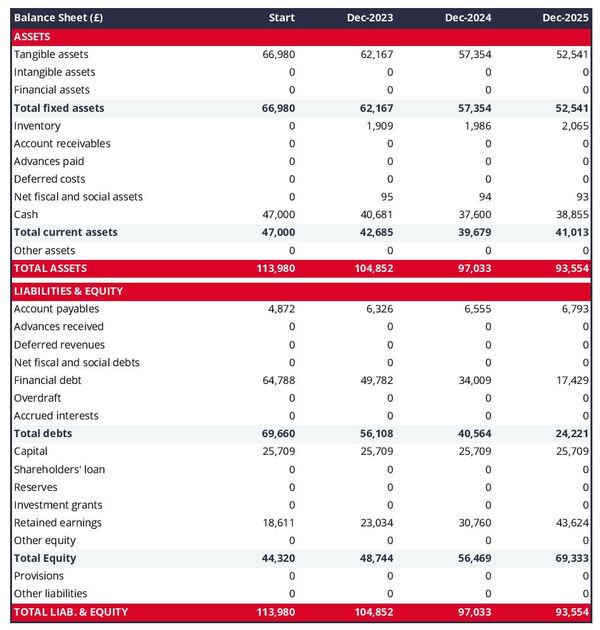
The cash flow projection
The cash flow forecast of your kosher restaurant will show how much cash the business is expected to generate or consume over the next three to five years.
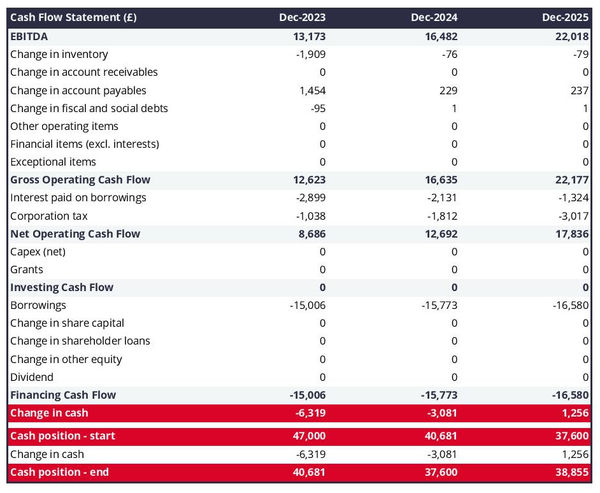
There are multiple ways of presenting a cash flow forecast but from experience, it is better to organise it by nature in order to clearly show these elements:
- Operating cash flow: how much cash is generated by the kosher restaurant's operations
- Investing cash flow: what is the business investing to expand or maintain its equipment
- Financing cash flow: is the business raising additional funds or repaying financiers (debt repayment, dividends)
Your cash flow forecast is the most important element of your overall financial projection and that’s where you should focus your attention to ensure that your kosher restaurant is adequately funded.
Note: if you are preparing a financial forecast in order to try to secure funding, you will need to include both a yearly and monthly cash flow forecast in your kosher restaurant's financial plan.
Need a convincing business plan?
The Business Plan Shop makes it easy to create a financial forecast to assess the potential profitability of your projects, and write a business plan that’ll wow investors.

Which tool should you use to create your kosher restaurant's financial forecast?
Using the right tool or solution will make the creation of your kosher restaurant's financial forecast much easier than it sounds. Let’s explore the main options.
Using online financial forecasting software to build your kosher restaurant's projections
The modern and easiest way is to use an online financial forecasting tool such as the one we offer at The Business Plan Shop.
There are several advantages to using specialised software:
- You can easily create your financial forecast by letting the software take care of the financial calculations for you without errors
- You have access to complete financial forecast templates
- You get a complete financial forecast ready to be sent to your bank or investors
- You can easily track your actual financial performance against your financial forecast, and recalibrate your forecast as the year goes by
- You can create scenarios to stress test your forecast's main assumptions
- You can easily update your forecast as time goes by to maintain visibility on future cash flows
- You have a friendly support team on standby to assist you when you are stuck
- It’s cost-efficient and much cheaper than using an accountant or consultant (see below)
If you are interested in this type of solution, you can try our projection software for free by signing up here.
Calling in a financial consultant or chartered accountant
Outsourcing the creation of your kosher restaurant financial forecast is another possible solution.
This will cost more than using software as you can expect as your price will have to cover the accountant’s time, software cost, and profit margin.
Price can vary greatly based on the complexity of your business. For a small business, from experience, a simple three-year financial forecast (including a balance sheet, income statement, and cash flow statement) will start at around £700 or $1,000.
Bear in mind that this is for forecasts produced at a single point in time, updating or tracking your forecast against actuals will cost extra.
If you decide to outsource your forecasting:
- Make sure the professional has direct experience in your industry and is able to challenge your assumptions constructively.
- Steer away from consultants using sectorial ratios to build their client’s financial forecasts (these projections are worthless for a small business).
Why not use a spreadsheet such as Excel or Google Sheets to build your kosher restaurant's financial forecast?
Creating an accurate and error-free kosher restaurant financial forecast on Excel (or any spreadsheet) is very technical and requires both a strong grasp of accounting principles and solid skills in financial modelling.
Most entrepreneurs lack the expertise required to create an accurate financial forecast using spreadsheet software like Excel or Google Sheets. As a result, it is unlikely anyone will trust your numbers.
The second reason is that it is inefficient. Building forecasts on spreadsheets was the only option in the 1990s and early 2000s, nowadays technology has advanced and software can do it much faster and much more accurately.
This is why professional forecasters all use software. With the rise of AI, software is also becoming smarter at helping us detect mistakes in our forecasts and helping us analyse the numbers to make better decisions.
Finally, like everything with spreadsheets, tracking actuals vs. forecasts and updating your forecast as the year progresses is manual, tedious, error-prone, and time-consuming. Whereas financial forecasting software like The Business Plan Shop is built for this.
Need a convincing business plan?
The Business Plan Shop makes it easy to create a financial forecast to assess the potential profitability of your projects, and write a business plan that’ll wow investors.

Use our financial projection templates for inspiration
The Business Plan Shop has dozens of financial forecasting templates available.
Our examples contain both the financial forecast, and a written business plan which presents, in detail, the company, the team, the strategy, and the medium-term objectives.
Whether you are just starting out or already have your own kosher restaurant, looking at our template is always a good way to get ideas on how to model financial items and what to write when creating a business plan to secure funding.
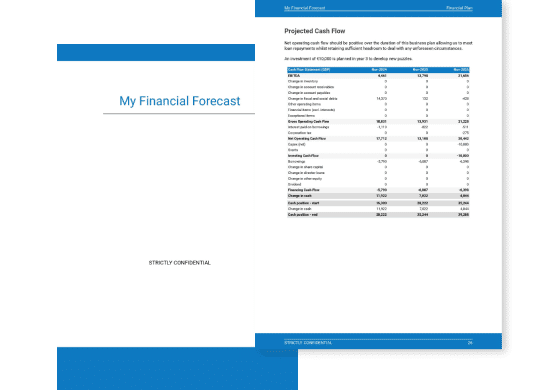
Takeaways
- A financial projection shows expected growth, profitability, and cash generation for your business over the next three to five years.
- Tracking actuals vs. forecast and keeping your financial forecast up-to-date is the only way to maintain visibility on future cash flows.
- Using financial forecasting software makes it easy to create and maintain up-to-date projections for your kosher restaurant.
You have reached the end of our guide. We hope you now have a better understanding of how to create a financial forecast for a kosher restaurant. Don't hesitate to contact our team if you have any questions or want to share your experience building forecasts!
Need a convincing business plan?
The Business Plan Shop makes it easy to create a financial forecast to assess the potential profitability of your projects, and write a business plan that’ll wow investors.

Also on The Business Plan Shop
- Example of financial projections
- How to project revenues for a business?
- Example of financial forecast for business idea
Know someone who runs or wants to start a kosher restaurant? Share our financial projection guide with them!


